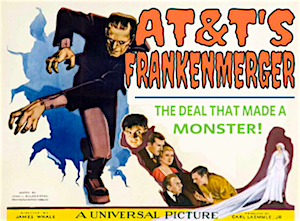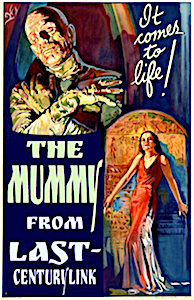
Fast, affordable Internet access for all.

Baratunde Thurston hosted Bruce Patterson on the most recent episode of his podcast How To Citizen. The episode is a deep dive into the consequences of a lack of competition in Internet access, and how the city of Ammon on stepped up to meet the challenge. Baratunde talks with Technology Director Bruce Patterson about how he got into this space, how the project got started, and the wealth of positive outcomes it has help drive for the community.
Listen here, then watch the video below on how the network is saving money, creating competition for broadband services, and creating powerful new public safety applications.

Mason County Public Utility District 3 covers a large area with a lot of people that have poor Internet access. If "PUD" didn't give it away, it is located in Washington State on the Olympic Peninsula and had already been investing in fiber as an electric utility for monitoring its internal systems.
Mason PUD 3 Telecommunications & Community Relations Manager Justin Holzgrove and Public Information & Government Relations Manager Joel Myer join us for episode 274 of the Community Broadband Bits podcast to discuss how they are expanding their open access fiber optic network to the public after seeing tremendous support not just for Internet access but specifically for the PUD to build the infrastructure.
We talk about how they are financing it and picking areas to build in as well as the role of the Northwest Open Access Network, which we have discussed on previous shows and written about as well. We cover a lot of ground in this interview, a good place to start for those interested in open access and user-financed investment.
This show is 38 minutes long and can be played on this page or via Apple Podcasts or the tool of your choice using this feed.
Transcript below.
We want your feedback and suggestions for the show-please e-mail us or leave a comment below.
Listen to other episodes here or view all episodes in our index. See other podcasts from the Institute for Local Self-Reliance here.
Thanks to Arne Huseby for the music. The song is Warm Duck Shuffle and is licensed under a Creative Commons Attribution (3.0) license.
Image of the Mason PUD 3 Fiberhood courtesy of COS Systems.

For episode 259 of the Community Broadband Bits podcast, we are going back to the well in Ammon, Idaho - one of the most creative and forward-thinking fiber network deployments in the country. Strategic Networks Group has completed a study examining the impact of Ammon's open muni fiber network on local businesses and residents.
To discuss the results, we welcome back Ammon Technology Director Bruce Patterson and SNG President Michael Curri. After a quick reminder of how Ammon's network works and what SNG does, we dive into how Ammon's network has materially benefited the community.
The city is expected to realize savings approaching $2 million over 25 years. Subscribers will be saving tens of millions of dollars and businesses seeing benefits over $75 million over that time frame. Listen to our conversation to get the full picture.
Bruce has visited us for the podcasts, including episode 207 on Software-Defined-Networks, episode 173 in which he described public safety uses for Ammon's network, and episode 86 from back in 2014 when local momentum was starting to grow for better connectivity.
Michael has also joined been on the show in the past. He participated in episode 93, talking about the benefits of broadband utilization.
This show is 31 minutes long and can be played on this page or via Apple Podcasts or the tool of your choice using this feed.
Transcript below.
We want your feedback and suggestions for the show-please e-mail us or leave a comment below.
Listen to other episodes here or view all episodes in our index. See other podcasts from the Institute for Local Self-Reliance here.
Thanks to Arne Huseby for the music. The song is Warm Duck Shuffle and is licensed under a Creative Commons Attribution (3.0) license.
Much like the the bone-chilling flicks celebrating eerie entertainment that dwells in the depths of our dark imaginations, monster cable and DSL Internet service providers strike terror in the hearts of subscribers…if they survive. Mesmerizing fees, hair-raising customer service, and shockingly slow connections can drive one to the brink of madness.
In celebration of Halloween 2016, our writers each selected a national ISP and reimagined it as a classic horror character. The results are horrifying! Read them here…if you dare!
AT&T’s Frankenmerger

by Kate
This shocking film tells the horrific tale of a mad scientist in his quest to create the world’s largest telecommunications monopoly monster. The scientist’s abomination runs amok, gobbling up company after company, to create a horrifying monster conglomerate. Watch the monster terrorize towns across America as it imposes data caps, denies people access to low-cost programs, and refuses to upgrade infrastructure. What nightmare lies ahead? Will the townsfolk and their elected officials unite to stop the monster, before it acquires Time Warner? Watch and find out!

The Mummy From Last CenturyLink
by Scott
Last August, we wrote and podcasted about the results of a broadband feasibility study for the City of Missoula, which recommended developing an open access network with approximately 60 miles of underground fiber through a public private partnership. The study also demonstrated a significant need for improved connectivity in the central business district, with almost 40% of businesses saying their connections were insufficient for their needs. The study also recommended a variety of fairly small policy changes to encourage the spread of fiber optics, such as a “dig once” conduit policy.
Early in December, the Missoula City Council acted on at at least one of those recommendations by lowering the fee the city charges for excavating and installing new fiber optic lines in the public right-of-way by 75 percent. City Councilwoman Caitlin Copple, who has spearheaded the efforts for better connectivity in Missoula and appeared on our Broadband Bits podcast in August, described lowering the fee this way to the Missoulian newspaper:
“It’s a gesture of good will to the service providers that we want to work with them,” said Copple, who chairs the city’s Economic Development Subcommittee. “It was a unanimous vote, and it shows Missoula is serious about business.”
The city also released a map, compiled by a third party, that shows all the privately-owned fiber assets in Missoula’s central business district. It is purposely unclear which company owns which segments of fiber, as the providers would only participate if their information was anonymized to protect their competitive edge. While certainly not present on every street, the map shows that there is a significant amount of fiber already in the ground. From the Missoulian:
This is the second of a three part series, in which we examine the current state of the UTOPIA network, how it got there, and the choices it faces going forward. Part I can be read here and Part III here.
With the status quo untenable, no easy exit strategy, and political opposition mounting, UTOPIA appeared besieged in early 2013. Then along came Macquarie, which started studying the network and putting together a proposal for a partnership. The full Milestone 1 report from Macquarie is here, but in case you aren’t prepared to read 100 pages the broad outlines are as follows:
A Wenatchee World article recently announced that Douglas County Public Utilities District is reducing the rate it charges to connect to the community fiber network. According to the July 18th article, connecting to the Douglas County Community Network (DCCN) previously cost a one time fee of $250. The PUD Commissioners decided to shave $100 off the price because revenue from the network is "more than covering" installation costs. Now $150 will connect a customer in the service area.
This reduction is one of several:
From 2010 to mid 2011, Douglas PUD required customers to pay the full cost of a hookup. At this rate, which could total more than $1,000 each, only about 30 customers signed up, Vibbert said.
In mid 2011, the PUD reduced the rate to $500 and enticed 139 more hookups. It reduced the rate again in mid 2012 to $250.
The open access network currently hosts six different providers, some offering telephone and television services in addition to Internet. The Wenatchee World notes that the DCCN is available to approximately 46 per cent of the Douglas PUD's 15,000 electric customers.
 As you read this, remember that the FCC's National Broadband Plan largely places the future of Internet access in the hands of these corporations.
As you read this, remember that the FCC's National Broadband Plan largely places the future of Internet access in the hands of these corporations.Hempfield charges utilities $750 for a right-of-way permit, $500 for a renewal, and $250 for a construction permit, according to a township ordinance. Ferguson said without the fees, the township would not be able to monitor the work. "We use the monies, those permit fees, to pay staff to make sure they repair roads as they're supposed to," Ferguson said. "Part of the fee is ... for our inspectors to go out and make sure they (utilities) complete the job right." Ferguson said utility companies sometimes dig up new roads to install or repair lines and leave the road in shambles afterward. "Taxpayers should not be required to pay the staff to make sure utility companies do the right thing," he said.
 Telecommunications providers have long claimed that local government fees are unreasonable and getting the necessary permits is too difficult. But when asked to document such claims, they rarely do. The FCC is currently examining whether it believes the fees charged by local governments are fair.
Telecommunications providers have long claimed that local government fees are unreasonable and getting the necessary permits is too difficult. But when asked to document such claims, they rarely do. The FCC is currently examining whether it believes the fees charged by local governments are fair.